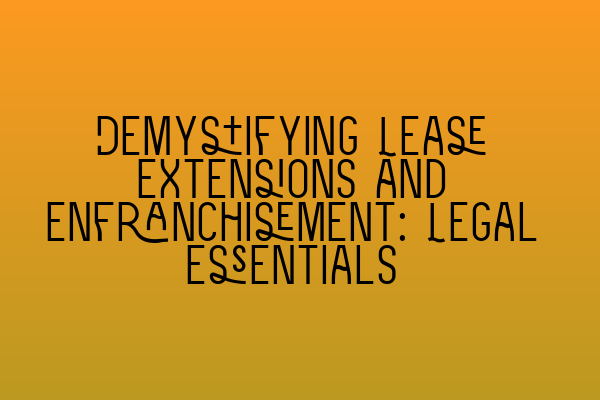Demystifying Lease Extensions and Enfranchisement: Legal Essentials
Are you a leaseholder looking to extend your lease or considering enfranchisement? Understanding the legal essentials of lease extensions and enfranchisement is crucial to making informed decisions and protecting your rights as a property owner. In this blog post, we will demystify the process and provide you with the necessary knowledge to navigate through lease extensions and enfranchisement.
Lease Extensions
As a leaseholder, you have the right to extend your lease under the Leasehold Reform, Housing, and Urban Development Act 1993. Lease extensions ensure that you can continue to occupy and enjoy your property without being subject to the limitations of a short or expiring lease.
The process of lease extension involves serving a formal notice on the freeholder, outlining your intention to extend the lease. It is essential to seek professional legal advice to ensure that the notice complies with all legal requirements. The notice will trigger negotiations with the freeholder, and terms such as premium, lease term, and ground rent will be considered.
When negotiating the terms, it is crucial to have an expert valuation of the property to determine the premium to be paid to the freeholder for the lease extension. The valuation takes into account various factors such as the length of the lease, property value, location, and rental yield.
Once an agreement is reached, a new lease will be drafted, incorporating the agreed terms. It is essential to review the lease carefully to ensure that it addresses all your requirements and protects your interests.
For a more in-depth understanding of lease extensions and to prepare for the SQE exams, check out our SQE 1 Practice Exam Questions and SQE 1 Practice Mocks FLK1 FLK2 articles.
Enfranchisement
If you are a leaseholder of a flat within a building or a member of a leasehold house, enfranchisement provides you with the opportunity to collectively purchase the freehold of the property from the freeholder. This enables you to gain more control over the management and maintenance of the building and potentially extend your lease to a much longer term.
The process of enfranchisement involves serving a formal notice on the freeholder, expressing your intention to acquire the freehold. Similar to lease extensions, it is crucial to seek legal advice to ensure that the notice satisfies all legal requirements.
Once the notice is served, the freeholder has the right to respond within a specified timeframe. If they agree to sell the freehold, negotiations will take place to determine the purchase price, known as the premium, and other terms and conditions.
Enfranchisement requires you to form a company or join an existing one to collectively purchase the freehold. It is important to carefully consider the structure, rights, and obligations of the company to protect your interests and ensure effective management of the property.
To excel in your SQE exams and gain a comprehensive understanding of enfranchisement, consider enrolling in our SQE 2 Preparation Courses and SQE 1 Preparation Courses.
Conclusion
Lease extensions and enfranchisement are complex legal processes that require expert guidance to ensure your rights are protected and you achieve the best outcome for your property. By understanding the legal essentials of lease extensions and enfranchisement, you can make informed decisions and navigate through the process confidently.
To stay up to date with the latest SRA SQE Exam Dates and further enhance your knowledge, visit our article on SRA SQE Exam Dates.
If you have any questions or require professional legal advice regarding lease extensions and enfranchisement, our experienced team at SQE Property Law & Land Law is here to assist you. Contact us today to schedule a consultation and discuss your specific needs.
